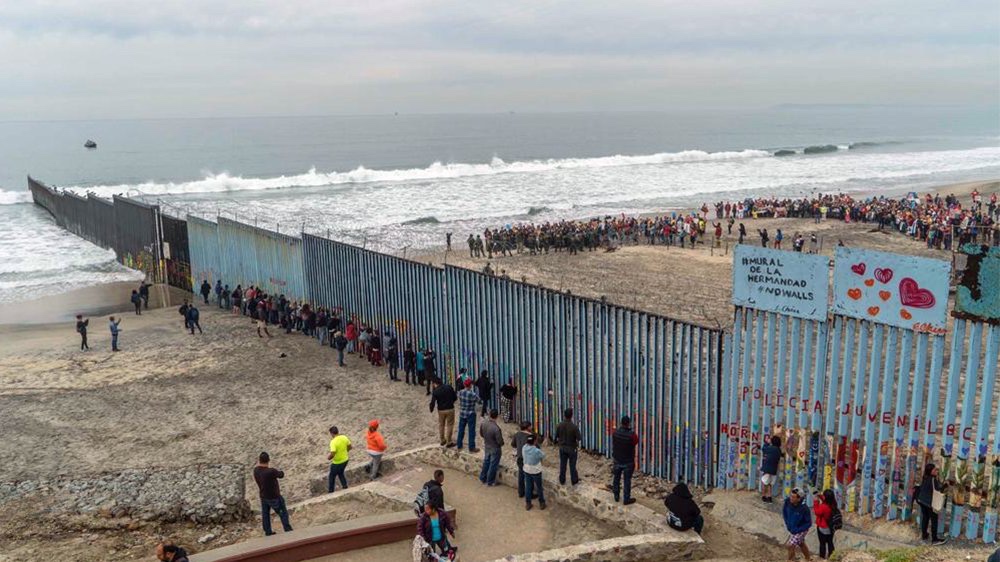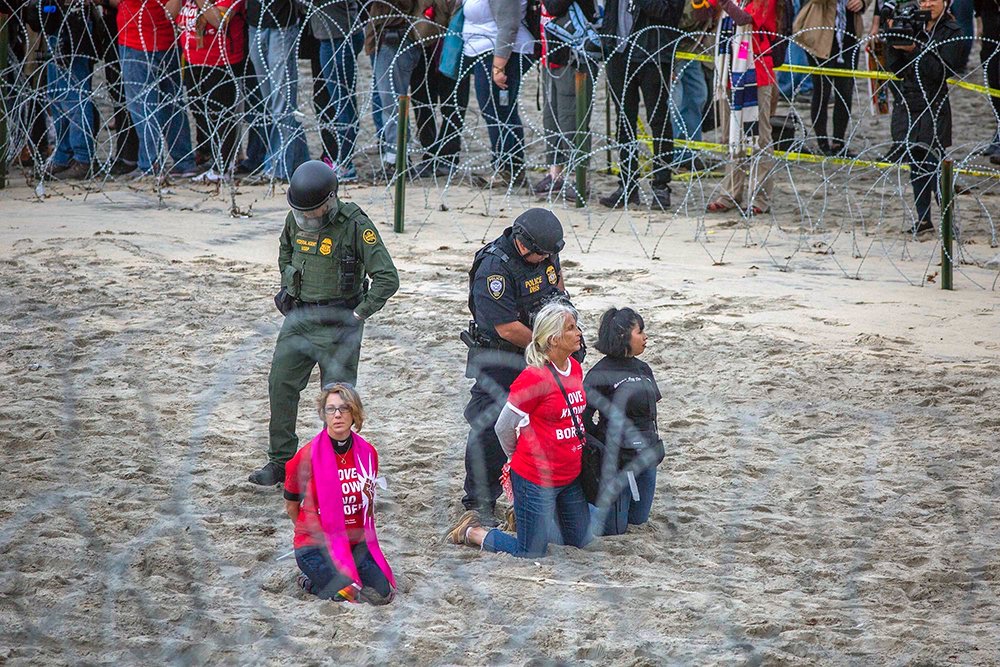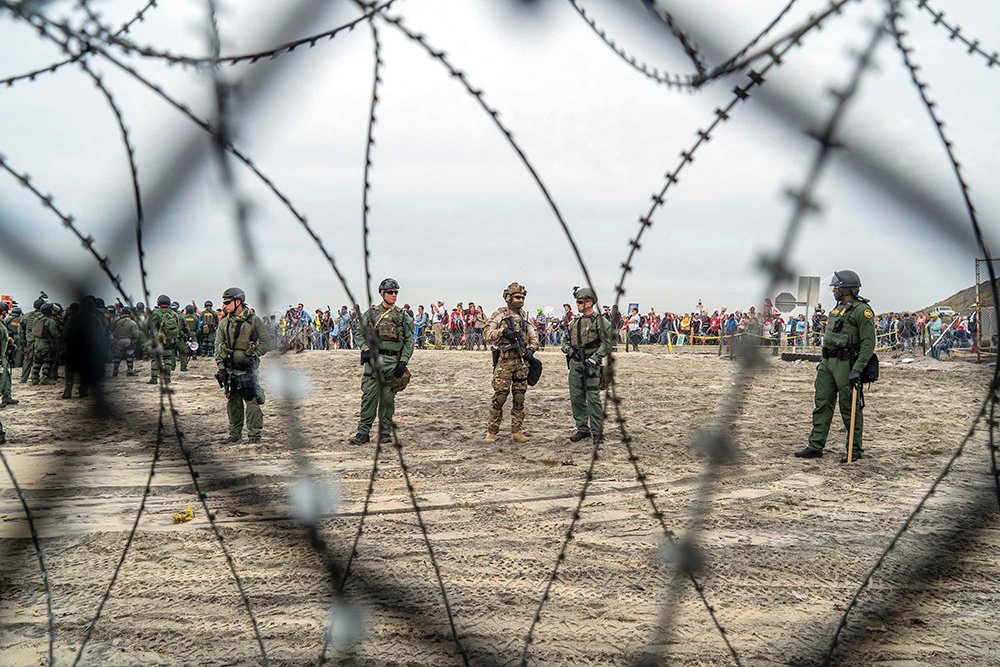
JACK JENKINS reports on how politics have changed the way a 25-year-old Christmas tradition was held at the US-Mexican border…
For a quarter of a century at Christmas-time, hundreds have gathered on both sides of the US-Mexico border just south of San Diego for a binational performance of a “posada,” a Mexican tradition in which worshippers re-enact the Biblical story of Mary and Joseph’s struggle to find a place to stay before Jesus was born.
But this year’s performance of the Binational Posada, which took place on 15th December, was a little different.
The most obvious change was in the service itself: Organisers said US Border Patrol agents forced those on the northern side to stand behind a second fence dozens of yards from the main fence, a first in the gathering’s 25-year history.

People protest against US immigration policies on the American side, right, of the US-Mexico border in Southern California on 10th December, 2018. PICTURE: Jair Cabrera Torres/RNS
The extra security follows the events of 10th December, when more than 30 religious leaders were arrested along the border – feet from where the Binational Posada would be held – while protesting the treatment of asylum seekers.
“It was really tough to coordinate the traditional posada song,” said Adam Estle, a participant at the service and director of field and constituencies for the National Immigration Forum. “Being so far apart – it was really difficult to actually do that in any sort of synchronisation.”
“It was really tough to coordinate the traditional posada song. Being so far apart – it was really difficult to actually do that in any sort of synchronisation.”
– said Adam Estle, a participant at the service and director of field and constituencies for the National Immigration Forum.
Not nearly so visible was the presence of more than 150 Christians – primarily evangelicals – who joined the gathering as part of a delegation organised by the Global Immersion Project and National Immigration Forum, flooding the ranks of attendees on both sides of the border fence.
The Christian contingent encapsulated how the political debates about US border policy have engaged faith groups in 2018. The widespread pushback to the use of tear gas against asylum seekers in a Central American migrant caravan, the separation of migrant families and calls to build a new border wall have moved religious Americans to come to the border – some to learn about the issues, others to express solidarity with immigrants.
Estle’s delegation, which organisers said included evangelical business leaders and non-profit executives, crossed the border into Tijuana, Mexico, where the group visited churches currently housing members of the caravan, met with city officials and heard lectures on the history of Central America and current US immigration policy.
In California, a group of clergy has teamed with labor unions to organise a one-day “Faith Caravan” on 22nd December that was expected to bus around 100 fellow clergy, local politicians, lawyers and medical professionals from Los Angeles into Tijuana. Once there, they planned to provide legal counsel and health screenings for caravan members seeking asylum in the United States and participate in an interfaith prayer service.
The “Faith Caravan” follows in the footsteps of religious groups such as World Relief, an evangelical Christian organisation that sent some of its legal services staff to Tijuana to assist those seeking asylum.
“The welfare of what the Bible calls ‘aliens’ is an essential part of the Judeo-Christian tradition,” said Rev Frank Alton, an Episcopal priest and one of the organisers of the trip. He added that he saw Christmas as a spiritually appropriate time for the trip.
“‘No room at the inn’ is such a perfect image [for this issue], a religious image, a theological image in the broader sense,” he said.

Border police arrest clergy and other protesters at a rally on the American side of the US-Mexico border in Southern California on 10th December, 2018. PICTURE: Jair Cabrera Torres/RNS
Other faith-based organisations are hosting events closer to those making decisions about the border. On 18th December, the Christian social justice group Sojourners and several other groups performed a posada procession in Washington, DC.
“Joseph and his family were strangers in their ancestral land,” Sandra Ovalle, Sojourners’ immigration campaigns coordinator, said at a press conference for the posada. “Posada invites us to re-examine our posture toward those who are looking for a place to rest, and they remind us today of the Central American migrants who find themselves estranged in their ancestral lands. We are invited to examine our posture of welcome as they make their way.”
“Posada invites us to re-examine our posture toward those who are looking for a place to rest, and they remind us today of the Central American migrants who find themselves estranged in their ancestral lands. We are invited to examine our posture of welcome as they make their way.”
– Sandra Ovalle, Sojourners’ immigration campaigns coordinator.
Ovalle and others called for faster processing of asylum interviews at the border, alternatives to detention and comprehensive immigration reform legislation.
Last week, two faith groups – Church World Service and the Justice for Muslims Collective – convened a vigil outside the offices of Customs and Border Protection to commemorate seven-year-old migrant Jakelin Caal Maquín, who died in CBP custody 13th December due to dehydration and shock.
But faith leaders continue to stream to the border region, urged by their consciences or bent on stirring the consciences of their fellow Americans.
Rabbi Charles Arian, head of the Kehilat Shalom synagogue in Gaithersburg, Maryland, organised a group of 10 people – mostly rabbis – to the region in mid-December through the Kino Border Initiative, a Catholic organisation that allows participants to learn more about immigration by providing assistance and ministry to migrants on both sides of the border.
Arian said he put out a call for companions on a border trip earlier this year, after news broke that the Trump administration was separating migrant families along the border. He acknowledged that the ongoing situation with the caravan added another layer of relevancy to the trip, but insisted it was about education, not activism.

US law enforcement personnel patrol the American side of the US-Mexico border as people protest in the distance in Southern California on 10th December, 2018. PICTURE: Jair Cabrera Torres/RNS
Still, he stressed the importance of sending faith leaders to observe the situation, including rabbis like himself.
“The commandment in the Torah that is most repeated is to ‘remember the stranger’ and ‘remember that you were slaves in Egypt,’” he said. “That’s repeated 36 times.”
He and his fellow participants met with immigrants during their stay and witnessed rapid-fire trials for migrants charged with misdemeanors for crossing the border illegally – a result of the Trump administration’s “no tolerance” policy. Arian expressed frustration with the system, saying the judge he observed did his best to treat immigrants humanely but was nonetheless caught up in a “machinery of injustice.”
“I think the slogans of the left and the right don’t appreciate the complexity” of the border situation, he said. “The only way it’s ever going to be fixed is if everybody sets aside ideology.”
Emily McFarlan Miller contributed to this report.





